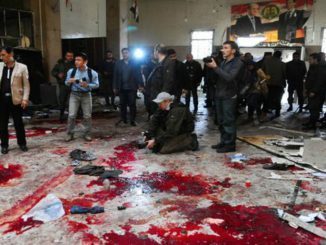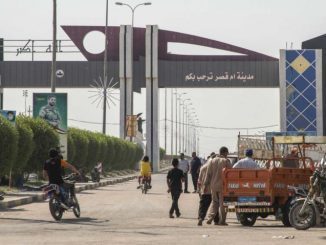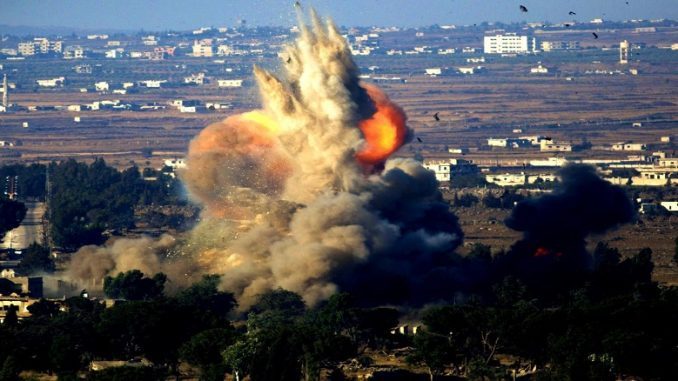
Syria’s civil war is in its tenth year with no end in sight. UN-brokered talks in Geneva have failed to emerge with tangible results; the Astana process, led by Russia, Iran, and Turkey, has also failed to deliver the promised political solution.
By: Afro-Middle East Centre (AMEC)
Meanwhile, the Syrian government and Russian forces pound rebel positions in the north of the country. At the same time, tensions in the south are threatening a new wave of violence between forces linked to Russia and Iran, while Israeli airstrikes continue attacking Iranian interests. This has made the cocktail of violence more volatile, worsening the already-devastated economy and humanitarian conditions.
Despite the relative calm in fighting in many parts of Syria, the north-western Idlib province has been under heavy Russian and Syrian government bombardment after a March 2020 ceasefire between Russia and Turkey ended in June. Bashar al-Asad’s regime, backed by Iran and Russia, has been leading a campaign to retake control of Idlib, which is currently in the hands of former Al-Qa’ida affiliate, Hayat Tahrir al-Sham (HTS), and other jihadi groups. Turkey, which backs a number of rebel groups, including HTS, has sought to delay the regime offensive by trying to convince these groups to disarm and surrender territory along the strategic M4 and M5 highway to regime forces. This has largely failed and the government offensive continues, despite Russia, Turkey and Iran, partners in the Astana process, claiming to pursue a political solution to the embattled Syrian conflict.
Russia and Iran, both supporters of Asad, have locked horns in the past year, with one result being continuing divisions in the Syrian military and security apparatuses and tensions flaring in the south-western Dera’a province. Compounding the situation are an increasing number of Israeli airstrikes against Iranian personnel and Iranian-sponsored militia in Syria; the most recent airstrikes targeted Iranian and Hizbullah positions in Damascus. A further complicating factor is that Turkey and Russia support opposite sides in the Libyan war, which has, thus, spilled into Syria as each of these two states recruits Syrian fighters to fight with opposing sides in Libyan.
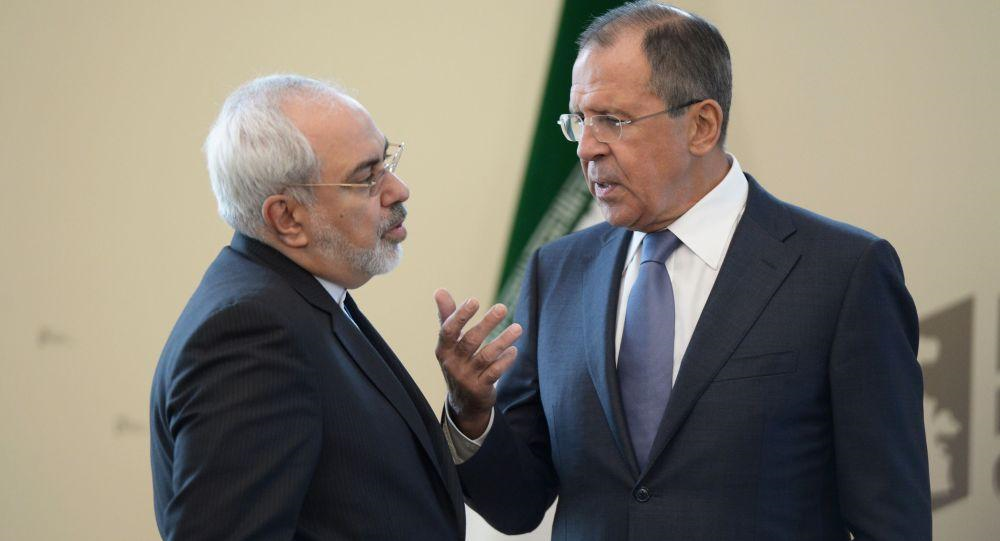
All of these national and international politics and military operations have worsened the lives of ordinary Syrians. Millions of Syrians facing a humanitarian crisis were dealt a immense blow on 12 July when Russia blocked a UN Security Council’s resolution that aimed to open humanitarian border crossings for the flow of aid to areas hard hit by the civil war.
Attempts to revive a political solution
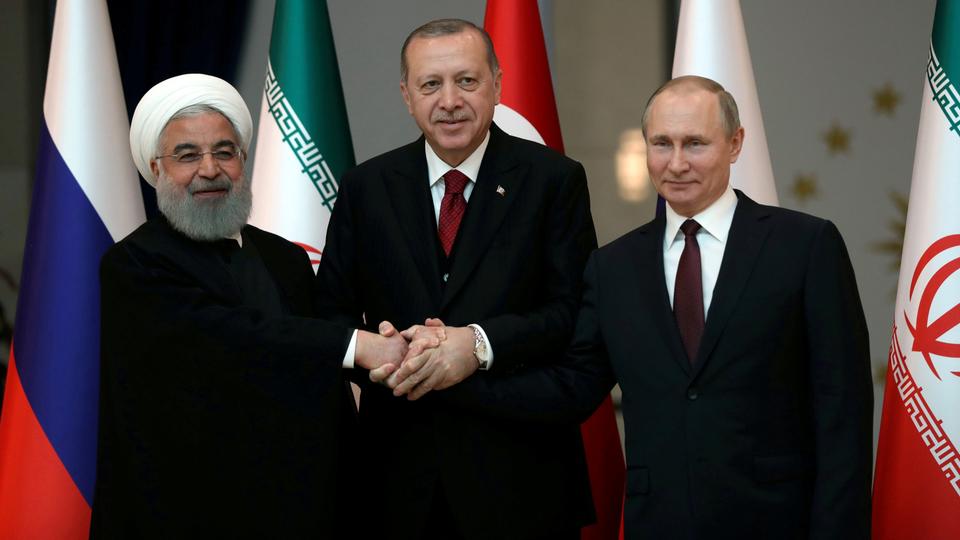
The presidents of Iran, Russia and Turkey met in a videoconference on 30 June to discuss the Astana de-escalation process they had agreed on in May 2017 in Kazakhstan. The Astana process has been dormant since the beginning of 2020, having become unworkable when the regime began battling rebel groups in Idlib. The meeting was the first since Turkey had clashed with regime forces in Idlib in March, when a Russian airstrike had killed at least thirty-three Turkish soldiers. The official statement of the virtual summit slammed the USA for seizing oil fields in the northeast; criticised the autonomous northeast region – controlled by the Kurdish Democratic Union Party (PYD) – and labelled them ‘illegal self-rule initiatives’; and condemned US sanctions on the Syrian regime, including the latest Caesar Act sanctionstargeting individuals linked to the regime.
Even as the three countries issued a joint statement, political differences between them were stark. Turkey and Russia clashed in February, causing the deaths of over sixty Turkish soldiers in Idlib. Turkey retaliated with ‘Operation Spring Shield’ against Asad’s forces, downing three Syrian fighter jets and killing many soldiers. Russia then accused Turkey of breaching the terms of the September 2018 de-militarisation agreement, and of cooperating with HTS. This Russian statement represented the high point of recent tensions between the two countries, and led to the signing of another ceasefire agreement early March that committed both states to joint patrols alongside the Idlib part of the M4 highway.
Turkey has funded a number of rebel groups, has launched various military campaigns in northern Syria, and has a large military presence in Idlib province, which borders Turkey.
The Turkish army has also conducted various cross-border military operations against Kurdish targets in northeast Syria, the one being dubbed ‘Operation Peace Spring’ in October 2019 under a US-brokered agreement that left Turkey controlling a 120-kilometer area between Tal Abyad and Ras al-Ain that had been under the control of the Kurdish-dominated and US-sponsored Syrian Democratic Forces (SDF). Turkey carries out these operations and maintains a presence in Idlib at the accommodation of Russia, even with Iranian disagreement. Iran disapproves of Turkish military operations in the northeast as well as plans for demilitarisation in Idlib.
It accuses Turkey of undermining Syria’s territorial integrity, and of giving control of the area to Free Syrian Army (FSA) rebels. Iran’s disagreements with Turkey have become obstacles in the implementation of the Russia-Turkey agreement, especially because Turkey is to be the guarantor of Idlib as an Astana de-escalation zone.
Iran-Turkey disagreements are, however, minute within the larger set of problems with the Astana process. The Syrian regime remains the biggest obstacle to a political solution, including its foot dragging on the UN Geneva process. The government’s focus is on its attempt to retake control of the entire country – with Russian and Iranian assistance, and little attention is paid to participation in the political process, despite occasional Kremlin pressure. The UN-Geneva process is a case in point.
The regime’s delegates always stall the process, outrightly rejecting most proposals from other parties, and resisting every attempt to proceed with any of the political processes. In December 2019, the UN Special Envoy for Syria, Geir Pederson, told the UN Security Council that the second round of talks had failed because Syrian regime officials refused to discuss constitutional reforms. This came after months of UN and Russian efforts to get the Asad government to agree to a list of opposition and civil society participants for the Constitutional Review Committee formed under the auspices of the UN, and supported by Russia and Turkey.
Idlib offensive
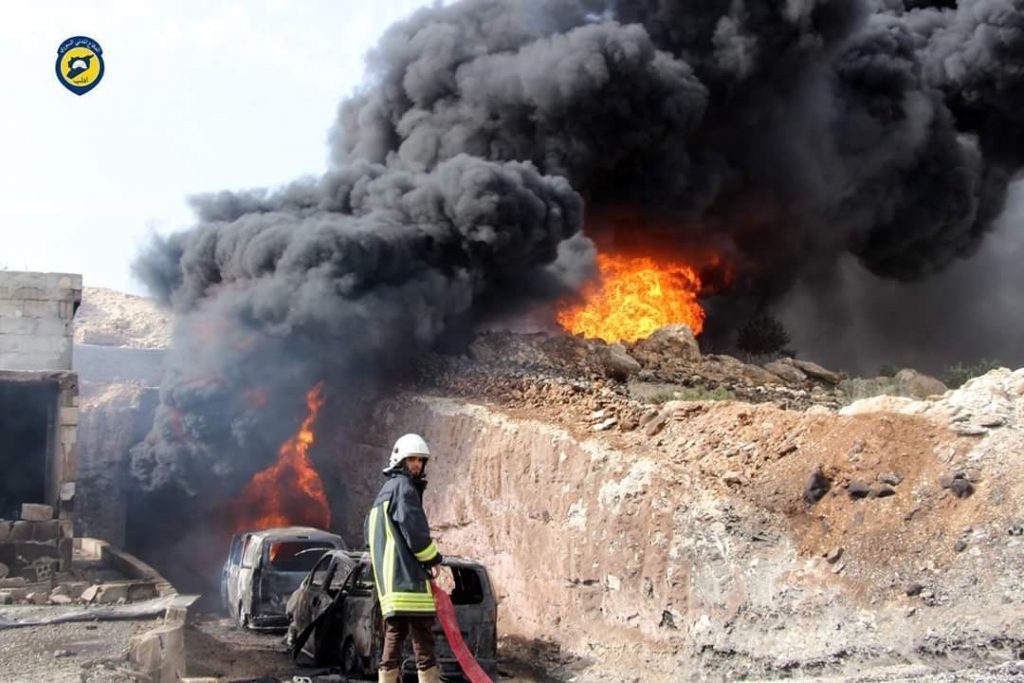
Instead, the regime set its sights on Idlib, the last rebel bastion in the country, under the control of HTS And other rebel groups. Idlib has become the haven for Syrian civilians and rebels who had fled regime bombardment in other, previously rebel-held, areas. It enjoyed relative calm for a while as the regime reconquered other parts of the country. From September 2018, a series of ceasefire agreements were signed between Russia and Turkey. Some three million people are at risk of displacement in Idlib because of continuing violence, and around one million are already housed in refugee camps along the Turkish border.
Although Russia seems to have a great appetite to revive and establish a political process to end the conflict, military operations place this project at risk. The Asad government has won back around seventy percent of the country and hopes to regain the remaining thirty percent over the next months, starting with Idlib. With the Idlib offensive in full swing after a few months of relative calm, the regime is still nowhere near to conquering the province, mainly thanks to Turkish interference. HTS, which controls around sixty percent of the province, has been cooperating with Turkey in a bid to stop Russian and Syrian army bombardments. In the process, the leader of the former Al-Qa’ida affiliate, Mohammed al-Julani, has rebranded the group and, at Turkish insistence, been suppressing dissenting groups, including those that are close or aligned to Al-Qa’ida.
Increasing Israeli airstrikes
The increasing number of Israeli airstrikes in Syria targeting Iranian and Hizbullah positions has added an additional layer of violence in the ongoing conflict. On Monday, 20 July, Israeli airstrikes violated Lebanese airspace and struck positions in south Damascus, killing Iranian-backed fighters and causing infrastructural damage. These airstrikes were the latest in a series of ongoing Israeli attacks against Iranian and Hizbullah forces. Israel, which previously did not acknowledge carrying out these attacks, has recently been more brazen about admitting to its striking Iranian interests in Syria. The airstrikes represent Israeli acts of war against Iran, and have been sanctioned by the US.
The Israeli airstrikes have also raised questions over the role of Russia, which appears to be turning a blind eye to Israeli incursions. Russia had previously summoned and reprimanded Israeli ambassadors over Israeli airstrikes in Syria. The most recent reprimand was in February 2020, when the Russian defence ministry condemned Israeli airstrikes in Damascus suburbs that nearly hit an airbus carrying 172 passengers. The Russian defence ministry still holds a grudge against Israel after a Russian reconnaissance aircraft was shot down by Israeli strikes in September 2018, but was seemingly downplayed by the Russian President Vladimir Putin. There seems to be a difference between the Russian defence ministry and the presidency on how to address Israeli operations in Syria.
Fragile situation in northeast Syria
The predominantly Kurdish region of northeast Syria has been in a fragile political situation after the Turks launched ‘Operation Peace Spring’ in October 2019. On 1 June, the Kurdish Democratic Union Party (PYD) – whose military wing, the Kurdish Protection Units (YPG), leads the US-backed Syrian Democratic Forces (SDF) – announced progress on reconciliation talks with the opposition Syrian National Council (SNC). The rival parties began reconciliation talks in November 2019, following the end of the Turkish offensive in the northeast. The SNC is based in Turkey and one of its members, the Kurdish National Council, is the only Kurdish faction at the UN Geneva talks.
Kurdish issues in Syria have been seized upon by the French government, which currently has tense diplomatic relations with Turkey over Ankara’s involvement in the Libyan conflict and Turkish naval manoeuvres in the Mediterranean. In May this year, French officials secretly met with the parties that form the Kurdish National Alliance (HNKS) and the PYD in a move seen as a direct provocation to Turkey. Turkey considers the SDF and PYD as affiliates of the Kurdistan Workers Party (PKK), which is in a state of war with and outlawed in Turkey.
Conclusion
The 30 June Astana meeting between Russia, Turkey and Iran revived a political process that seemed to have reached an untimely end because of political problems between the leaders of the process. Russia continues complicated bilateral relations separately with Turkey and Iran pertaining to the Syrian conflict, thus putting the Astana process in a never-ending quagmire. The regime’s offensive in Idlib supported by Russia ended a ceasefire agreement signed between Turkey and Russia in March, compounding an already-alarming humanitarian crisis for three million Syrians displaced in the province. This has put the Turkish-Russian relationship in a precarious position in Idlib as rebels continue to fight against the regime and Russia.
Iran, which also supports the regime’s Idlib offensive is looking to counter increasing Israeli attacks against its positions inside Syria. Although the recent Astana meeting addressed these issues, it is yet to translate to tangible results on the ground. Meanwhile, boiling tensions in Dera’a remain unresolved, threatening renewed violence. Russia’s bid to restore territorial control to the Syrian regime saw it force the closure of two UN humanitarian aid crossings, leaving open only the Bab al-Hawa crossing in the northwest. This puts a strain on an already-struggling Syrian population because of the failing economy and US sanctions.

